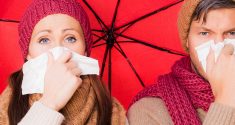With colds and virulent flu strains sweeping the nation this winter, many people are looking for healthy and natural ways to avoid getting sick. Many supplements on the market offer protection, but these have mixed results in scientific research. There is only one thing that is proven to help you defend against these common cold-weather viruses and bacterial invaders: your immune system.
Although there is no way to guarantee that your immune system will be able to stand firm against colds and viruses, there are several ways to tip the odds in your favor. According to new research, getting enough sleep can make all the difference in your immune battle: Getting enough sleep protects against cold and flu viruses by helping your immune system in several key ways.
Sleep and Immunity

This is likely part of the reason that insomnia and other sleep disorders have been linked to increased rates of infectious illness. In one study, researchers looked at people who sleep six or more hours every night and those who sleep less than this. They also tracked how often these people became ill. People who sleep less than the recommended six or more hours were 4.5 times more likely to catch an infectious illness. This was true even when adjusted for other factors such as age and general health.
The bottom line? Regardless of other risk factors for illness, you are less likely to get sick when you are getting six or more hours of sleep every night. But why is this?
How Sleep Protects Against Cold and Flu
Every day we are exposed to hundreds of thousands, even millions, of germs. These include bacteria and viruses. Our immune systems are well-trained to fight off most of these germs. When bacteria or viruses can evade our immune system long enough to infect us, we become ill.
Sleep appears to bolster our immune system in several ways. One study found that getting enough sleep can lead to increased numbers of a specialized immune cell called a T cell. T cells are crucial in recognizing and attacking invading cells such as viruses. Increased T cell levels mean a greater chance of fighting off that cold or flu before you so much as sneeze.
In addition, our immune systems rely a great deal on immune memory. Once your immune system has encountered a germ that causes illness, it is better-primed to recognize this germ in the future and kill it before it can cause an infection. Sleep appears to play a role in the formation of immunological memory. The cells that form our immune memory are at their highest levels when we are in slow wave deep sleep. When you do not get enough sleep, you have lower levels of the very cells you are trusting to keep you from getting sick from that same cold you had last year.
Preventing Illness Naturally
With cold and flu season in full swing, getting enough sleep is more important than ever. However, there are a few other things that you can do to 
- Wash your hands or use portable hand sanitizer often.
- Ask sick people around you to use face masks and to cough or sneeze into their arm rather than on their hands.
- Drink plenty of water; around eight full glasses a day.
- Avoid shaking hands and performing other activities that put you in direct contact with hands and faces.
- Eat a healthy diet, with plenty of fruits and vegetables; these contain the nutrients that your immune system needs for optimal function.
- Avoid becoming too warm or too cold by dressing in layers that can be put on or shed as needed.
- Avoid crowded places such as community events and shopping centers when possible.
- Get exercise on a daily basis.
- Get your vaccinations; although these do not protect against all strains of influenza, they will give you immunity from the ones thought most likely to cause serious illness in any given year.
There is no way to guarantee that you won’t come down with a fever or sniffles tomorrow. However, healthy lifestyle choices will ensure that you have the best possible chances in fighting the good fight against common seasonal illnesses.







